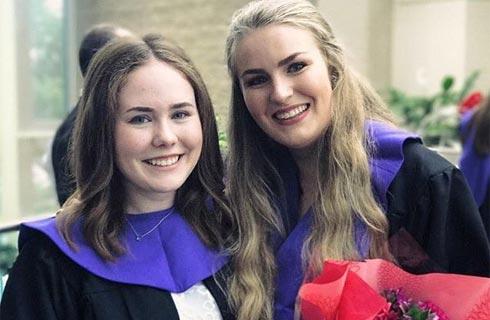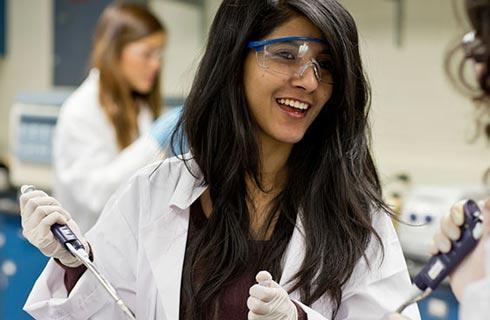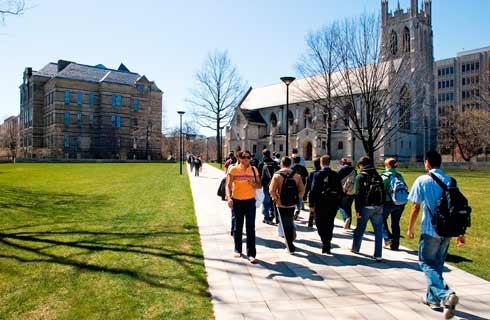Master of Science in Molecular Biosciences

学历文凭
Masters Degree

专业院系
Molecular Biosciences

开学时间

课程时长

课程学费

国际学生入学条件
IELTS: at least 7
Students wishing to pursue graduate studies in Molecular Biosciences should have an undergraduate major in biochemistry, biophysics, cell biology, genetics, microbiology, biology, chemistry, or closely related fields. Applicants will need to submit the following: the Graduate School application, which will include a personal statement describing your qualifications, goals, and objectives in pursuing graduate research in molecular biosciences, official transcripts from all colleges attended, and three letters of recommendation. Applicants for admission must have or anticipate receiving a bachelor's degree from an accredited school before the start of the semester for which they have applied to the Graduate School. Previous schools must be accredited by a recognized accreditation association. Applicants must have a 3.0 grade point Avg of graded undergraduate coursework, or from graded graduate coursework where there are 12 or more graded semester hours of graduate coursework taken after the bachelor's degree.
IDP—雅思考试联合主办方

雅思考试总分
7.0
- 雅思总分:7
- 托福网考总分:100
- 托福笔试总分:600
- 其他语言考试:MELAB: at least 86
CRICOS代码:
申请截止日期: 请与IDP联系 以获取详细信息。
课程简介
相关申请
 预科
预科 奖学金
奖学金 实习机会
实习机会 在校学习
在校学习 跨境学习
跨境学习 校园授课-线上开始
校园授课-线上开始 在线/远程学习
在线/远程学习
开学时间&学费
学费信息仅供参考,请与IDP联系以获取详细信息
| 开学时间 | 时长 | 学费 | 地点 |
|---|---|---|---|
| 暂无 | 暂无 | 暂无 | 暂无 |
学校排名

世界排名301
数据源:
泰晤士高等教育世界大学排名
关于华盛顿州立大学

华盛顿州立大学(WSU)热烈欢迎所有国际学生加入WSU的''美洲狮''大家庭。华盛顿州立大学是美国西部历史最悠久的赠地大学之一,自1890年以来一直激励着问题解决者。华盛顿州立大学(WSU)的目标是提供鼓励学习者让世界变得更美好的教育。学生在整个职业生涯里都是个人和全球专业关系网中的一员,并享有终身会员资格。国际学生占学生群体总人数的百分之七,代表着115多个国家/地区 。海外学生受益于许多机会,例如出国留学和职业发展活动。该大学提供超过4亿美元的奖学金和学生资助,其中有几个奖项只为国际学生办法。学校共有98个本科专业, 78个硕士学位和65个博士学位课程可供学习。 其中有三个专业学位方向为医学、药学和兽医学。许多计划在全国乃至世界范围内均被评为最佳计划。 华盛顿州立大学的教授们真心关心学生并致力于帮助学生成功,并通过激发创造力的多样方法进行教学。6个校区华盛顿州立大学在华盛顿州有五个不同的校区,以及在线校区。每个校区都根据学生的需求提供不同的内 容。大部分课程设立于华盛顿州立大学普尔曼校区,以便学生们可以在传统美国大学中环境中生活和学习。学生可以轻松地与同学会面并结交新朋友,同时享受校园周围有趣的活动。
本校相关课程
其他相关课程

生物化学理学士(荣誉学位)
 滑铁卢大学
滑铁卢大学学历文凭
Bachelor Degree with Honours
开学日期
课程费用总额


生物分子科学哲学博士
 劳伦森大学
劳伦森大学学历文凭
Ph.D.
开学日期
课程费用总额


生物化学理学学士
 劳伦森大学
劳伦森大学学历文凭
Bachelor Degree with Honours
开学日期
课程费用总额


生物化学与分子生物学理学学士
 达尔豪斯大学
达尔豪斯大学学历文凭
Bachelor Degree
开学日期
课程费用总额


生物化学理学学士
 温尼伯大学
温尼伯大学学历文凭
Bachelor Degree
开学日期
课程费用总额


生物化学与分子生物学理学学士
 特伦特大学
特伦特大学学历文凭
Bachelor Degree
开学日期
课程费用总额










 美国
美国





